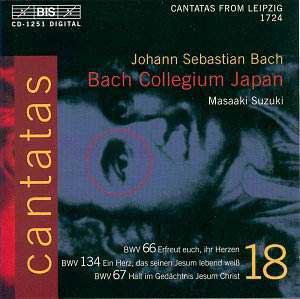Masaaki Suzuki continues his complete set of Bach’s
sacred cantatas with this volume 18, featuring three cantatas from Bach’s
early years in Leipzig, both written in April 1724. Suzuki’s restrained
forces and excellent soloists once again put Bach into a very welcome
perspective, as compared with other recordings of the cantatas.
The opening work on this disc, cantata BWV 66, is one
of the most joyous of all of Bach’s cantatas. The opening movement alone
is perhaps among the finest movements in all western sacred music. The
pure joy that overflows in this movement - with both a choir that exudes
joy and solo and with duet sections that express much more subtlety
- is rare indeed. Unfortunately, this recording is marred by a slightly
annoying trumpet in the essential parts of this movement. While the
instrument does not sound bad, it is slightly out of tune at
times, during its fastest sections, and detracts from the overall sound.
Suzuki mentions, in the notes to this recording, that the trumpet is
optional - he might have done better to leave it out, or to at least
to tone it down, as Phillip Herreweghe did in his recording of the same
work. Nevertheless, this movement, and the entire cantata, show just
how strong this cycle is. Not only are the instrumentalists outstanding,
and the choir near perfect, but the soloists are among the best. Robin
Blaze is one of the finest altos recording the cantatas, and is remarkable
in the duet in this work. Peter Kooij is also one of the best basses
and Makoto Sakurada contributes with great style to the duet with Robin
Blaze.
Cantata BWV 134, also written in April 1724, for Easter
Monday, features a beautiful duet for alto and tenor, Wir danken und
preisen dein brünstiges Lieben, which is certainly the centre and
high-point of this work. With long instrumental ritornelli similar to
Bach’s Brandenburg Concertos, written around the same time, this duet
is performed very well by Blaze and Sakurada, though the orchestra is
as much a soloist here as the singers.
BWV 67 is a much shorter cantata than the first two.
At under 14 minutes, it is about half as long as each of the others.
Its movements are much shorter, but it contains some fine music as well.
The high point of this cantata is the bass/chorus aria Friede sei mit
euch!, which Kooij sings very well. But this cantata certainly pales
in comparison with the two other works on this disc.
This is a very good disc, marred by the trumpet in
cantata BWV 66. While all the musicians and soloists are top flight,
this one instrument mars the sound for me (I much prefer Herreweghe’s
smoother effect for this cantata). Nevertheless, this is yet another
jewel in one of the best recorded series of cantatas.
(One final comment - Bis includes excellent, thorough
notes with all the recordings in this series, and most of their releases.
However, the type size for these notes is quite small, making them difficult
to read for many people. The text is much smaller for the Bach Cantata
recordings than other Bis discs, such as the CPE Bach series.)
Kirk McElhearn
Visit the Bach
Collegium Japan webpage for reviews of other releases in this series


![]() See
what else is on offer
See
what else is on offer 